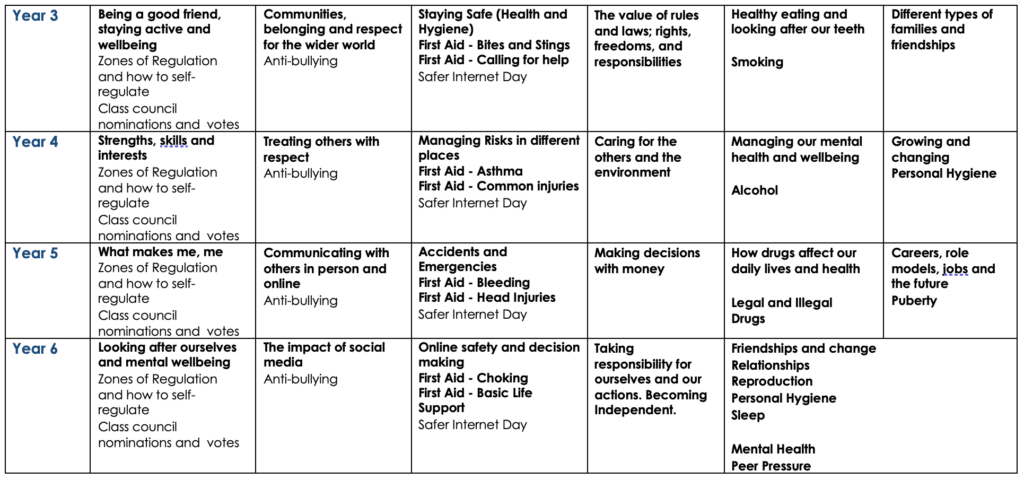PSHCE
How We Teach Personal Social Health and Citizenship Education (PSHCE) at the BJS Federation of Schools
Intent
At the BJS Federation of schools, our PSHCE curriculum is designed to develop the whole child through carefully planned and resourced lessons. The curriculum helps children to develop the skills, knowledge and attributes to ensure that they are developing personally and socially, while also promoting their social, mental and physical development. The curriculum is designed to develop the children’s understanding of their role as global citizens in a diverse society; how to develop and maintain healthy relationships; how to stay healthy physically, emotionally and mentally; the rule of law; and democracy. We provide opportunities for the children to learn about rights and responsibilities, RSE, Drugs Education and E-Safety.
The BJS Federation of Schools’ PSHE content aims to introduce students to sensitive matters in an age appropriate manner. Inclusion of topics like Relationships and Sex Education (RSE), First Aid, Drugs and Alcohol, have been chosen to guide all students, including vulnerable and potentially vulnerable groups, while also meeting our statutory duties.
Children at the Federation schools are encouraged to develop their self-confidence and self-worth, through a robust pupil leadership programme. Election to many of these roles enforces the children’s understanding of voting and rights as these roles are elected through a democratic process. Children are encouraged to contribute to both school life and the wider community.
Particular attention is paid to the 5 core rules throughout each school day:
- Be kind
- Be responsible
- Be respectful
- Be hardworking
- Be a good listener
Zones of Regulation and Growth Mindset approaches are used in and around the school so that children learn how to self-regulate and recognise their emotions. These approaches are taught systematically as part of the PSCHE curriculum and are continually referred to during the school day.
Implementation
PSHCE is taught weekly as part of the planned programme of study for all pupils, focusing on the core themes of Relationships, Health and Well-being and Living in the Wider World. Cross-curricular links are then made to other National Curriculum subjects, such as Science, PE, Computing and RE as well as British Values and SMSC. Circle times and whole school, Icons and Phase assemblies are used to reinforce the core messages as well as to promote the schools’ values and drivers (Enterprise, Possibilities, Environment, Communication and Wellbeing) that underpin our curriculum.
The PSHCE curriculum starts at the earliest stages of EYFS where the PSED strands from Development Matters and the outcomes from the Early Learning Goals have been used to map the learning across this phase of the school. Learning develops from the children’s starting point in pre-school and progresses through EYFS, linking with the learning in Year 1 and beyond.



Impact
All children understand the importance and relevance of PSHCE and British Values. They are able to talk about their wellbeing and know who they can speak to if they need help within school. The children know that they are valued members of the school and wider community and the role they play within this.
Because we actively, systematically and deliberately teach the children: how to stay safe and healthy, resilience, self-regulation, empathy and tolerance, they know that their actions have an impact on others and on the wider world. The PSHE programme increases the children’s self-esteem and reduces barriers to learning for all pupils. The skills that the children learn through the PSHCE curriculum have a far-reaching impact and improve outcomes across the curriculum, and in pupil behaviour.
Students leave our schools with a sound understanding of the features of healthy lifestyles and healthy relationships, including online safety. They are able to recognise the influence of external and internal influences for unhealthy and risky behaviours and have learned some strategies to help manage difficult situations. They will be able to use language respectfully whilst recognising and challenging unacceptable language and behaviour.
The PSHCE curriculum enables children to leave the BJS Federation of schools healthy, responsible and independent citizens, who go on to make a positive contribution to society.







